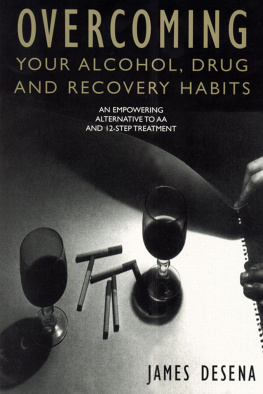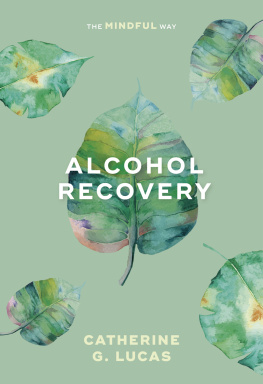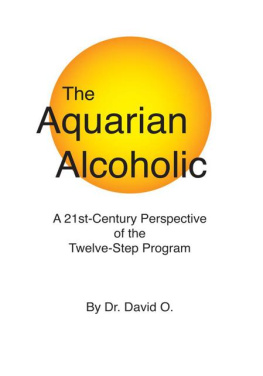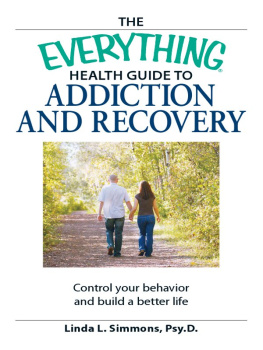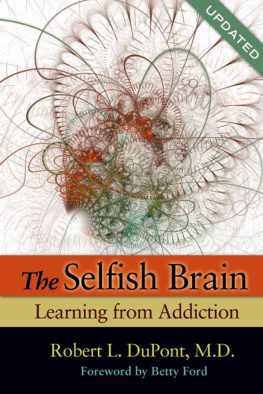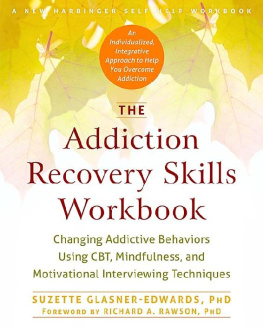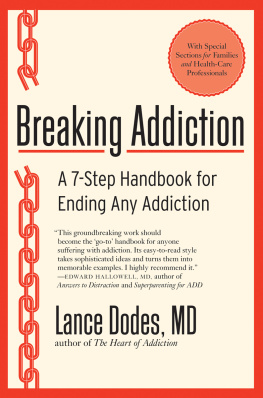Lets confront the unpleasant reality and say it out loud, AA doesnt work for many of the people struggling to overcome alcohol and other drug problems, and yet there continue to be precious few treatment alternatives. Dont despair if youve tried the traditional route and failed. Follow James DeSenas suggestions for Overcoming Your Alcohol, Drug and Recovery Habits and find your own path to sobriety.
Scott D. Miller, Ph.D., author of Working with the Problem Drinker and The Miracle Method: A Radically New Approach to Problem Drinking
If you have doubts about what happens in 12-step oriented treatment, and no place to turn for a fresh perspective, this book is for you!
A. Thomas Horvath, Ph.D., FAClinP, President of SMART Recovery, author of Sex, Drugs, Gambling & Chocolate: A Workbook for Overcoming Addictions
This book is incredibly well written, thoughtful, truthful, and incisive. The method Jim outlines for discovery instead of recovery is inspired. I hope many who are not satisfied with AA and its program will read his book and find answers to some of their questions. This book is a wonderful addition to the literature on alternatives to AA as well as exposing some of the harder truths behind the AA message.
Marianne Gilliam, author of How Alcoholics Anonymous Failed Me
Jim DeSenas powerful quit for good abstinence approach short-circuits distorted thinking and empowers addicted pesons to reclaim their lives. This book celebrates freedom-from-addiction alternatives and is a welcome addition to the alcoholism lierature.
James Christopher, founder of Secular Organizations for Sobriety, author of How to Stay Sober and SOS Sobriety
Overcoming Your Alcohol, Drug and Recovery Habits does a fine job of exposing the lies and harmful effects of AA and 12-step treatment. This book will provide a welcome ray of hope to the many, many individuals who have gone through AA and 12-step treatment, yet continue to relapse. It will help them get off the exceptionally destructive recovery merry-go-round and retake control of their own lives.
Charles Bufe, author of Alcoholics Anonymous: Cult or Cure?, co-author of Resisting 12-Step Coercion: How to Fight Forced Participation in AA, NA, or 12-Step Treatment

Copyright 2002 by James DeSena. All rights reserved.
For information contact See Sharp Press, P.O. Box 1731, Tucson, AZ 85702.
E-mail:
Web site: http://www.seesharppress.com
DeSena, James, 1956.
Overcoming your alcohol, drug, and recovery habits: an empowering alternative to AA and 12-Step treatment / James DeSena; with an introduction by Joseph Gerstein, MD. -- Tucson, AZ : See Sharp Press, 2002.
188 p. ; 23 cm.
Includes bibliographical references and index.
ISBN 1-884365-29-9
1. AlcoholismTreatmentEvaluation. 2. Drug abuseTreatmentEvaluation. 3. Alcoholics Anonymous. 4. Twelve-step Programs. 5. Self-help techniques. I. Title.
616.8606
For Leanna and Anthony,
that they may always know freedom
Contents
Introduction
by Joseph Gerstein, M.D.
I am a physician. If a patient of mine turned out to have a cancerous breast lump of a certain common type, I would sit with her and discuss in detail her options for treatment. The options would, naturally, be based on an up-to-date assessment of the information available in the medical literature and would include modified radical mastectomy (surgical removal of the breast) and lumpectomy (removal of the lump with a modest amount of normal tissue around it) followed by radiation therapy. Medical research has demonstrated that either approach would have the same outcome in terms of survival. A middle-aged woman with severe emphysema or a frail elderly woman with multiple, severe medical problems might receive the added option of doing nothing, on the presumption that either treatment might be more likely to be detrimental than doing nothing.
Any deviation from this general scenario would likely result in a disciplinary action by the state Board of Medical Licensure. A physician who offered only one of the two options would probably even have his or her license summarily suspended pending a hearing on more severe sanctions, so heinous a deviation from ethical medical behavior would this be considered.
Yet, this very scenario will be enacted a thousand times daily, all over America, as people with severe alcohol problems seek or are coerced to seek advice about treatment in offices, clinics, emergency units and detoxification units.
We have a situation in which both licensed professionals and laypeople with only their personal experience in overcoming alcohol dependence and informal training, either through ignorance or fanatic zeal or stubbornness or monolithic training, offer only one treatment option to their clients despite prodigious amounts of scientific evidence that many other reasonable alternatives exist and make no attempt whatsoever to determine which of these might offer the greatest opportunity for success, which might coincide with the clients religious beliefs (or non-beliefs) and/or temperamental peculiarities or preferences.
I should know. For the first 20 years of my medical practice career, that is exactly what I did. Thats how I was trained. Thats what I was told. And thats what I did... out of ignorance, not out of malice.
Now I know better. Jim DeSena, in this volume, delineates clearly and in detail that this one size fits all approach to alcohol abuse and dependence is as archaic as leech application. It is time for the healing professionals to get over this Berlin Wall mentality and open themselves to the bright light of thousands of outcome studies (including the huge MATCH study) which amply demonstrate that there is more than one way to skin a cat.
Also, as Jim DeSena demonstrates, the fundamental Hippocratic precept First, Do No Harm, is also abrogated on a daily basis. There are those who are harmed by the inappropriate referral because they lose precious time, during which their lives continue to unravel, perhaps never to be raveled again. There are those who decide to resist the prescribed treatment, which they perceive as alien and therefore get no appropriate treatment. And, there are those who come to be convinced to accept beliefs, which lead them to believe they are incorrigible, beliefs which are inapplicable to them and will permanently prevent them from recovering because of this factor alone.
This is a perverse train of events. Just because a treatment may be proper and effective for some people does not mean that it must be good for everyone. Medical studies usually require a control group because it is recognized that practically all treatments have a propensity for negative results as well as positive and that failure of the treatment is not automatically attributable to the bad intentions or incompetence of the patient. And what about all those, probably the majority, who will recover spontaneously. Must they, too, be condemned to a life of daily meetings and to carry the disparaging descriptor alcoholic for the rest of their natural lives even if they dont ever drink alcohol again?
Jim DeSenas excellent book is one more cogent and eloquent plaint for a rational, humane and scientifically validated approach to proper matching of clients with addiction problems to treatment appropriate for them.
Joseph Gerstein, M.D., FACP
Harvard Medical School
Preface
Next page
